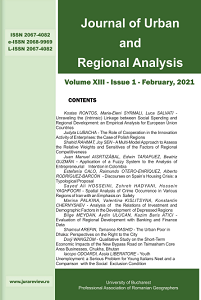UNRAVELING THE (INTRINSIC) LINKAGE BETWEEN SOCIAL SPENDING AND REGIONAL DEVELOPMENT: AN EMPIRICAL ANALYSIS FOR EUROPEAN UNION COUNTRIES
UNRAVELING THE (INTRINSIC) LINKAGE BETWEEN SOCIAL SPENDING AND REGIONAL DEVELOPMENT: AN EMPIRICAL ANALYSIS FOR EUROPEAN UNION COUNTRIES
Author(s): Kostas Rontos, Maria-Eleni Syrmali, Luca SalvatiSubject(s): Politics, Social development, Economic development, EU-Approach / EU-Accession / EU-Development, Socio-Economic Research
Published by: Editura Universitară
Keywords: social policy; welfare systems; indicators; recession; Southern Europe;
Summary/Abstract: Theoretical approaches and place-specific solutions are required to face with the intrinsic linkage between social welfare and macroeconomic stability in advanced economies, especially in Europe. In this regard, the 2007 recession has influenced extensively the wide spectrum of social policies applicable in the European Community. New socioeconomic divides emerged and fiscal austerity urged Member States to resettle policy discourses, advancing social needs in a more effective way. In line with this evidence, our commentary discusses recent literature and it outlines policy implications of different political, institutional and socioeconomic settings. By analyzing cross-country variations in the shape and extent of welfare policies at the European level, our study evaluates apparent (and latent) performances of welfare systems in a comparative perspective, with a specific focus on Southern European countries. The existence of a latent relationship between social policy expenditures (SPE) and per-capita GDP was demonstrated. However, social expenditures may differ for a given level of income: for instance, Latvia had a lower level of social expenditures given its income level. Italy, Greece, Spain and Portugal were clustered together displaying a lower share of social spending in the total GDP in respect with the remaining European countries. This comparison suggests how Mediterranean countries are institutionally fragile and with a moderately higher level of corruption in respect with North-western countries. The results of this work contribute to bridge the semantic dichotomy between theoretical approaches and empirical findings in socioeconomic policy impact analysis.
Journal: Journal of Urban and Regional Analysis
- Issue Year: 13/2021
- Issue No: 1
- Page Range: 5-18
- Page Count: 14
- Language: English

